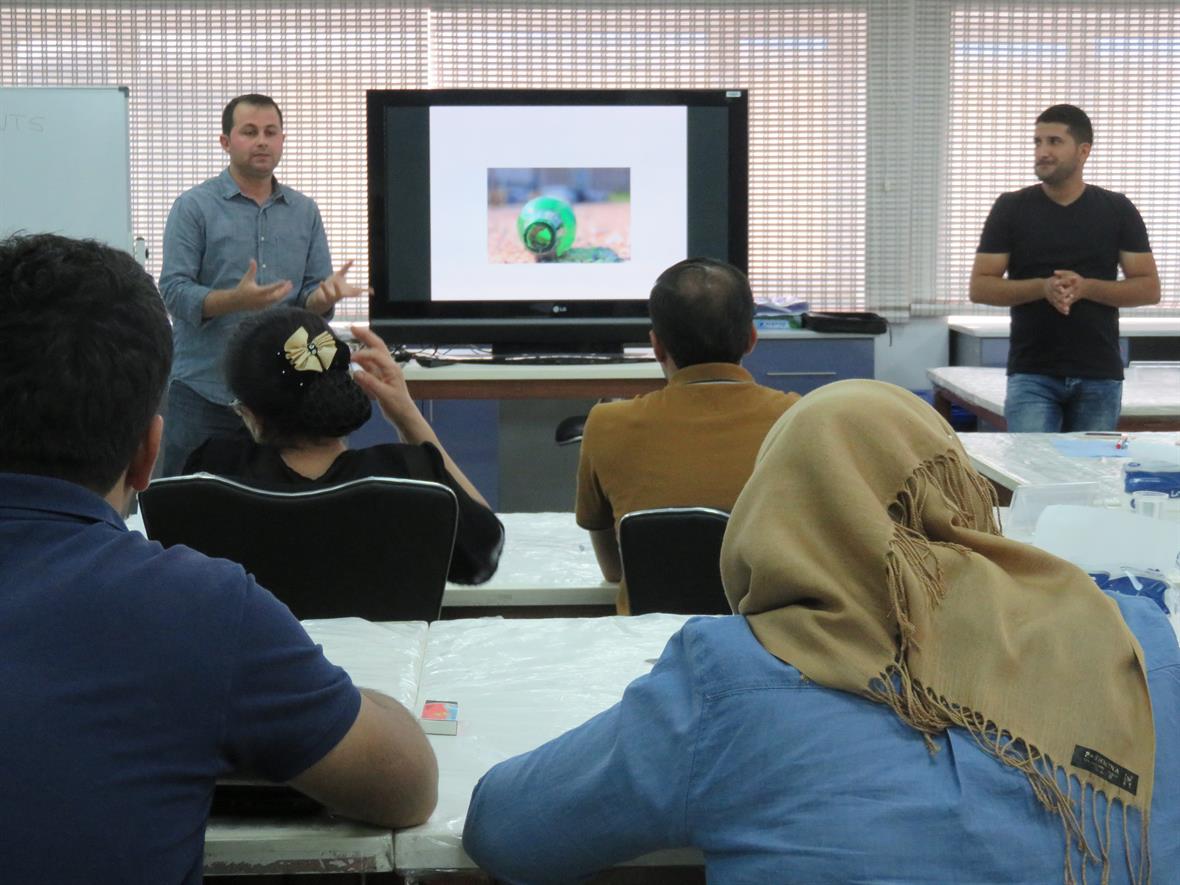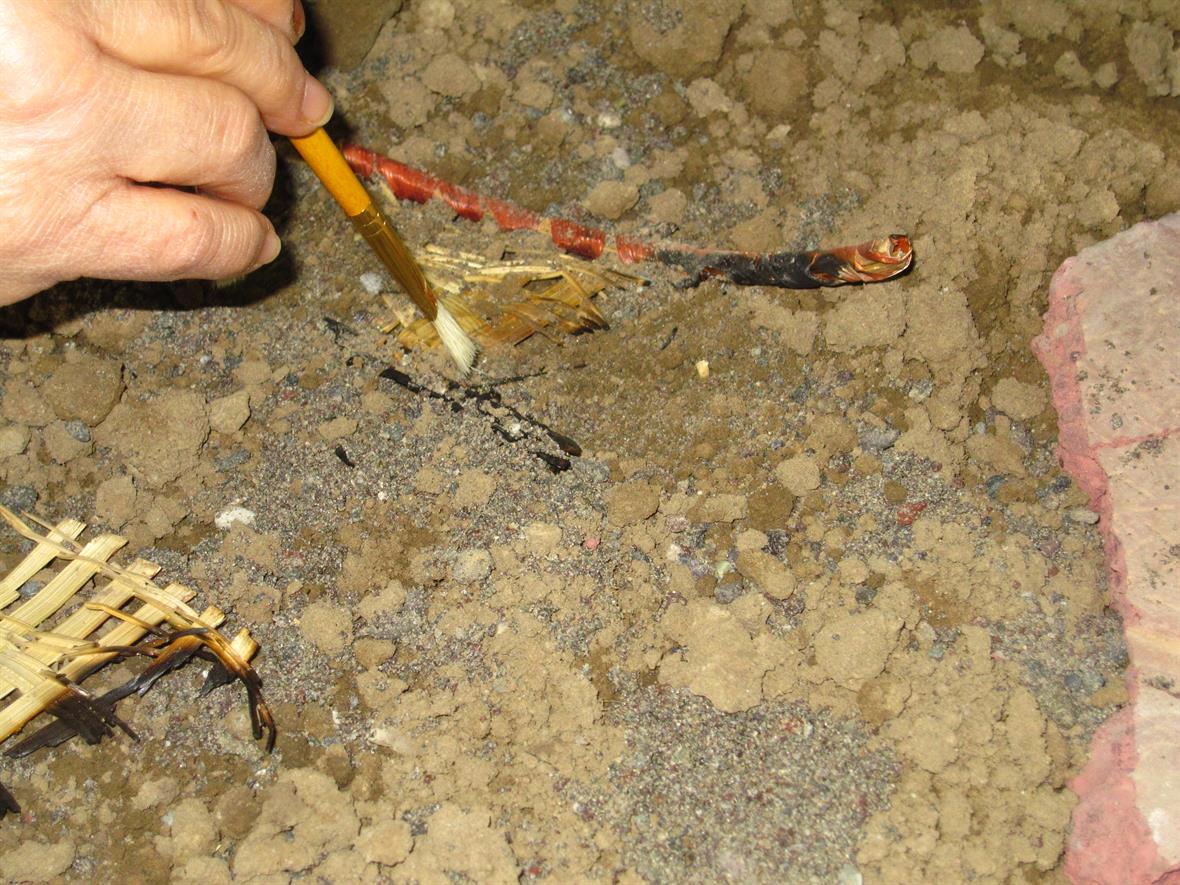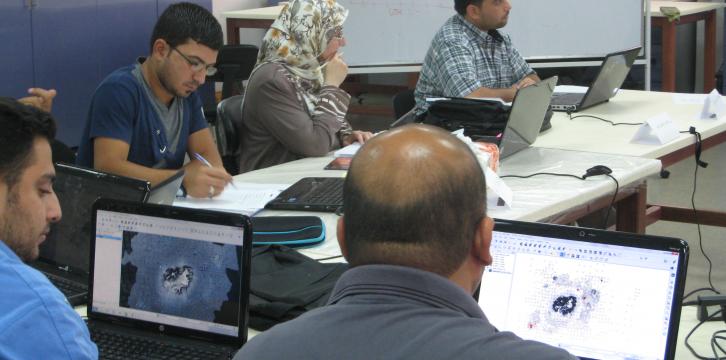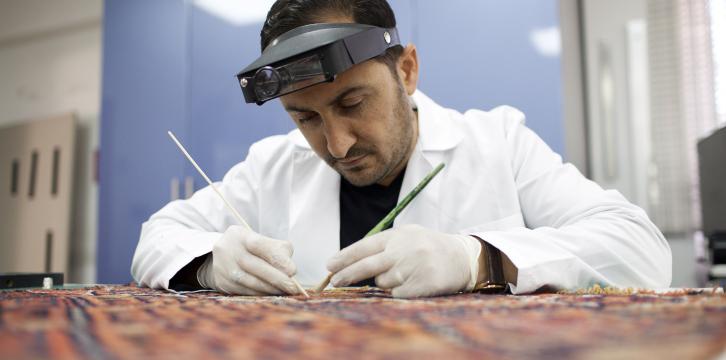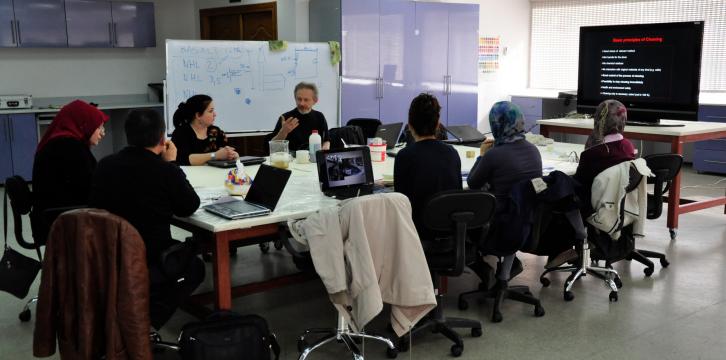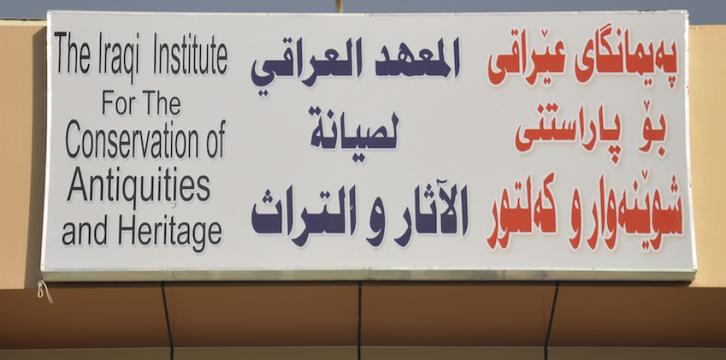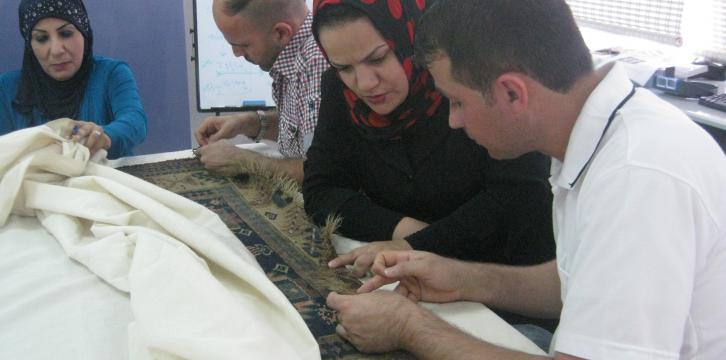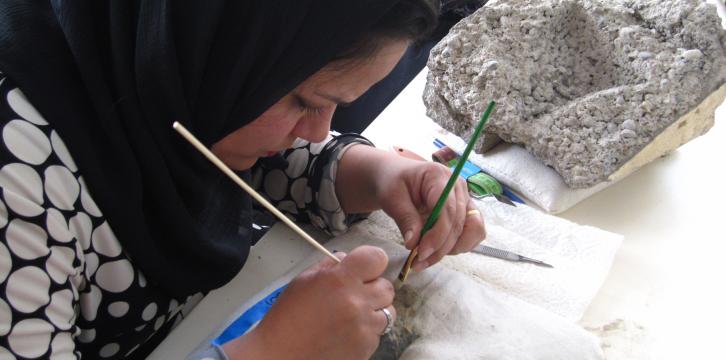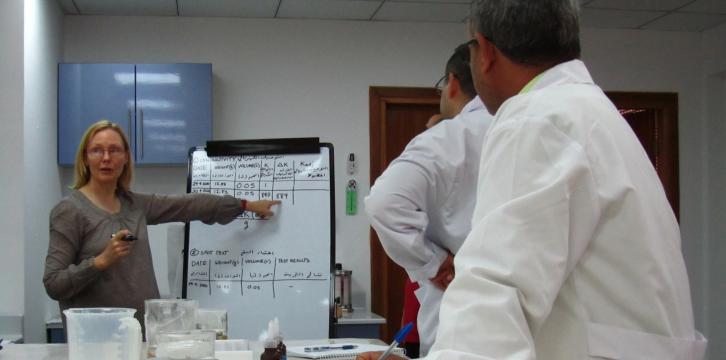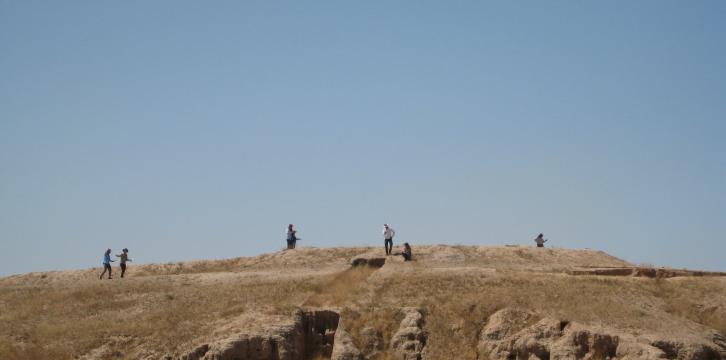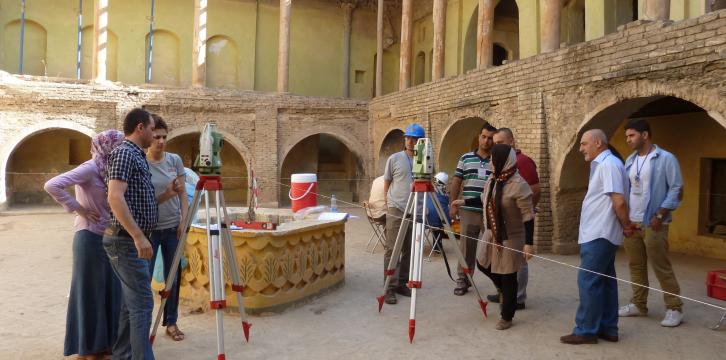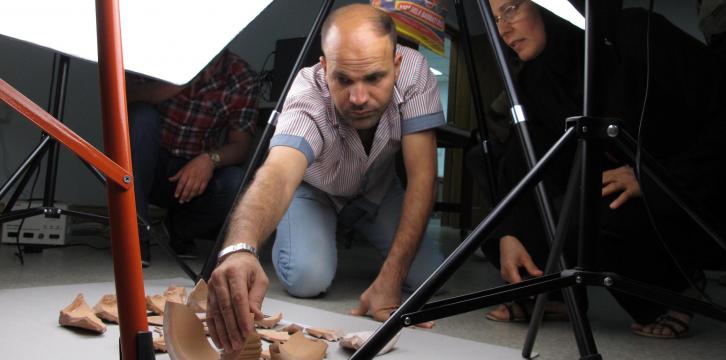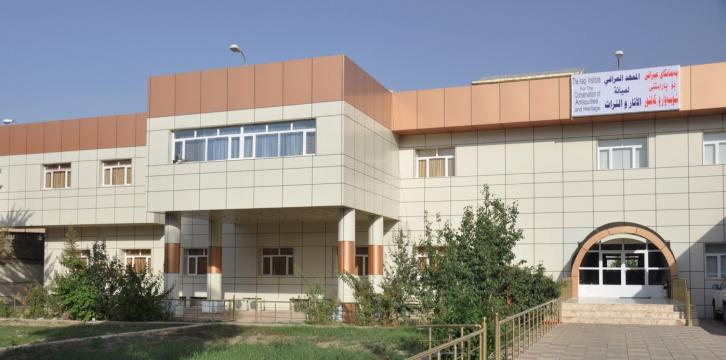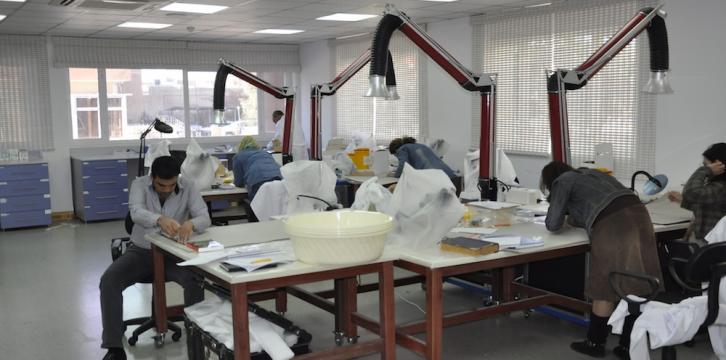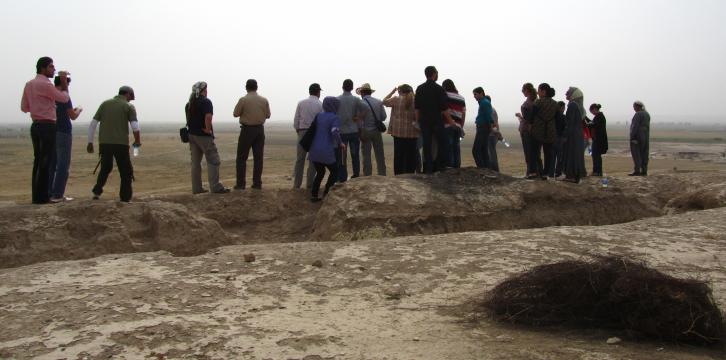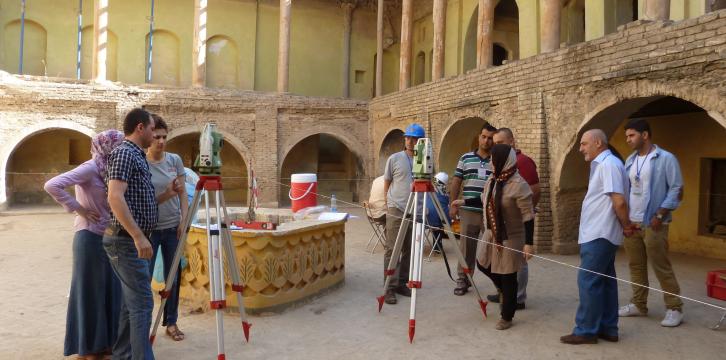
Iraqi Institute
The Iraqi Institute for the Conservation of Antiquities and Heritage
The Iraqi Institute for the Conservation of Antiquities and Heritage preserves the legacy of humanity contained in the unique cultural heritage of Iraq. It accomplishes this through educating people in conservation and preservation and by inviting professionals from around the world to share their expertise.
Iraq's people share the heritage of ancient Mesopotamia, the "cradle of Western civilization." Iconic sites throughout the country, including the famed temples of Babylon, the ziggurat at Ur, and Nimrud, capital of the Assyrian empire, chronicle early human history and the roots of western civilizations. Religious and secular structures such as the spiral minaret at Samarra, the Yazidi temple at Lalesh, the Erbil citadel, 19th-century Ottoman homes and historic souks document the complex web of faiths, empires and trade that have shaped Iraq. Museum collections in the country exhibit everything from artifacts recovered from Neanderthal sites and imposing Assyrian bas-reliefs to exquisite ivory figures from Nimrud, graceful Islamic calligraphy and traditional Kurdish textiles from the many ethnic and religious communities in the country.
Iraqis are committed to preserving this extraordinary heritage and, since 2008, have partnered with American institutions including the University of Delaware and UD's Department of Art Conservation to create the Iraqi Institute for the Conservation of Antiquities and Heritage (IICAH) that provides Iraqi cultural heritage professionals with the educational resources they need to address Iraq's acute, far-reaching preservation issues.
Prior to 1980, Iraq boasted a robust and internationally recognized cultural heritage sector staffed by career professionals with advanced degrees and decades of experience in museum management and archaeology. The Iran-Iraq war of the 1980s, the 1991 and 2003 Gulf Wars, decades of disinterest in cultural heritage on the part of a repressive government, and the isolation and sanctions of the 1990s decimated this sector leaving a shrinking staff lacking basic skills to manage, interpret and preserve damaged, looted and deteriorating sites and collections. More recently, Iraq's heritage sector has been challenged by extremist terrorist action, such as the intentional, rampant destruction of cultural heritage by ISIS.
IICAH's mission is to help rebuild Iraq's cultural heritage sector by providing in-country training in the preservation and conservation of their cultural heritage for Iraq's museum and heritage professionals. Students are drawn from the active ranks of the Iraqi State Board of Antiquities and Heritage (SBAH) and the General Directorate of Antiquities under the Kurdistan Regional Government (KRG), provincial antiquities departments and university faculty and staff; they are already working in positions where they can apply their newly acquired training and access to international networks.
The Institute, located in Erbil, is a well-equipped modern educational facility offering programs reflecting international standards. Courses are taught by international experts and Iraqi teaching assistants using local resources and materials. IICAH participants include men and women, Arabs and Kurds, Sunni and Shia, Christians and other faiths, from across Iraq—all drawn together by a shared passion for the preservation of one of the world's oldest civilizations and home to some of mankind's most ancient artifacts.
Information about current IICAH-related initiatives can be found on the Smithsonian Institution website.

The Iraqi Institute for the Conservation of Antiquities and Heritage (IICAH) is the result of a remarkable Iraqi-American partnership. Since opening in 2009, IICAH has hosted Iraqi and internationally sponsored courses and meetings. Programs have reached hundreds of Iraqi heritage professionals. The courses, and other activities at the IICAH, help to fulfill the IICAH mission to help rebuild Iraq's cultural heritage sector. The Institute is located in Erbil, the largest city in the Kurdistan Region of Iraq and home to the ancient 8,000-year-old Erbil citadel.
The Iraqi Institute for the Conservation of Antiquities and Heritage represents a collaboration between numerous Iraqi and US governmental and academic institutions that began in 2008.
Iraq's problems, however, began long before 2008. Prior to 1980, Iraq boasted a robust and internationally recognized cultural heritage sector, staffed by career professionals with advanced degrees and decades of experience in museum management and archaeology. The Iran-Iraq war of the 1980's, the 1991 and 2001-2003 Gulf Wars, decades of disinterest in cultural heritage on the part of a repressive government, and the sanctions of the 1990's resulted in a precipitous reduction in Iraq's professional heritage staff, and neglect and deterioration of museum collections and archaeological and heritage sites. Iraq's heritage crisis culminated with the highly visible looting of the Iraq Museum in 2003, which drew international attention to the decades of decline in Iraq's heritage sector.
Seeking a solution to Iraq's heritage preservation needs, in 2008 the US Embassy Baghdad awarded a two-year Targeted Development Program (TDP) grant to fund the Iraq Cultural Heritage Project (ICHP). The keystone of this project was the creation of a cultural heritage educational program for Iraqi heritage professionals. Designed in consultation with the Iraqi State Board of Antiquities and Heritage (SBAH) and leading American conservation and preservation educators, the program created the Iraqi Institute for the Conservation of Antiquities and Heritage to deliver critically needed preservation education. The creation of IICAH met the goal of providing in-country courses offering programs to international standards, taught by international experts using local resources and materials.
In consultation with the SBAH, this center was located in Erbil, in the Kurdistan Region of northern Iraq, to ensure ready access both to Iraqis and foreign experts. The Kurdistan Regional Government (KRG) has been extremely supportive of this initiative. The governor of Erbil provided a large residential teaching facility in downtown Erbil located immediately below the historic citadel, and contributed funds to renovate and furnish the building, which now boasts modern classrooms, laboratories and dormitory space.
The IICAH's core educational program in museum collections conservation launched in October 2009 under the guidance of three expert partner institutions heavily engaged in conservation education: the University of Delaware Department of Art Conservation, the Winterthur Museum, Gardens and Library and the Walters Art Museum. The course, consisting of three 8-week modules followed by weeklong practicums, was offered to current Iraqi government employees working in cultural heritage. A second 16-week program in historic preservation was introduced in 2010 and a course in archeological site preservation in 2013. These programs established the basic course organization with class instruction modules in Erbil alternating with practicums in home institutions.
A program for Master Trainers was established in 2010, to provide advanced students with the opportunity to serve as teaching assistants and further their education with the goal of assuming increasing amounts of the teaching responsibilities. One of these master trainers was awarded a Leon Levy Visiting Fellowship to study at New York University's Art Conservation Program in 2012.
The University of Delaware served as the lead partner through 2015 using funds from a variety of sources (US Embassy, Baghdad, Bureau of Educational and Cultural Affairs of US Department of State, the Mellon Foundation, the Getty Institute, and the Kurdistan Regional Government) to continue the project. Jessica S. Johnson served as Academic Director, working with the current IICAH Director Dr. Abdullah Korsheed, the Board and the Advisory Council in implementing and developing collaborations for training, outreach, and education in support of the Institute mission.
2014 brought many changes to the IICAH. In January, Brian Lione was named Executive Director, to better support the administrative needs of the IICAH in addition to academic programming. ISIS continued to move through the country, and the IICAH and others anxiously tracked their progress. In August 2014, IICAH was forced to evacuate students and staff and temporarily close as ISIS threatened Erbil.
Also, in 2014, Academic Director Jessica Johnson accepted a new position as Head of Conservation of the Museum Conservation Institute at the Smithsonian Institution with the understanding she would remain heavily involved with IICAH.
In 2015, the IICAH worked to reconnect with its US partners while establishing new opportunities for collaboration. In direct response to the ISIS threat to cultural heritage, the IICAH hosted the "Emergency Preparedness and Disaster Response" course in May and August. This course brought together experts from the University of Pennsylvania with funding from the Prins Claus Fund and the JM Kaplan Foundation. The effort provided needed training to twelve Iraqi heritage specialists; it was also notable as the first time the IICAH received and managed a grant without external assistance.
In 2015, as the ISIS threat decreased, long-time US partners were able to again plan for comprehensive coursework at the IICAH. With the Smithsonian Institution at the lead, classes began again in early 2016. Eighteen Iraqi students enrolled in the 22-week "Fundamentals of Conservation" course which provided the foundational context and skills for more advanced courses in conservation of ancient and historic objects, architecture and archeological sites. Students continued to be drawn from the active ranks of the SBAH and KRG, and provincial antiquities departments and university faculty and staff. The course organizers continued to employ the proven model of teaching to those already working in positions where they can apply their newly acquired training and access to international networks.
Throughout its history, IICAH has provided a rich assortment of introductory and advanced courses and opportunities in addition to the longer foundation courses. Other groups such as the International Committee on Missing Persons, the World Monuments Fund, the University of Arizona, Boston University and the Superior Institute for Conservation and Restoration in Rome of the Italian Ministry of Culture have used IICAH facilities for preservation related courses and workshops. The IICAH has also hosted an international array of archeologists engaged in field work and their analysis, planning meetings of Governorate antiquities directors, targeted response and recovery workshops for cultural heritage, and tours for Iraqi school and university groups.
Board
To ensure a sustainable future for the IICAH, in 2011 SBAH and the Governor of Erbil signed a Memorandum of Agreement establishing a five-member management Board – three members appointed by the SBAH, and two by the Erbil Governor. Dr. Abdullah Korsheed was named President Chair of the Board and continues to serve in that position.
Members
- Dr. Omar Abdul-Razzaq, Director of Antiquities, Salahaddin Province, State Board of Antiquities and Heritage (SBAH)
- Dr. Ali Alhyali Ghanim, Head of Training, SBAH, Baghdad
- Dr. Abdullah Khorsheed, Chair, Director, IICAH; Professor, Salahaddin University, Erbil
- Dr. Numan J. Ibrahim, Professor, Salahaddin University, Erbil
- Engineer Ayad Tariq Hussein, Director of Antiquities, Kirkuk Province, SBAH
Advisory Council
An advisory council of Iraqi and American experts was created in 2012 to advise the Board on academic programs and assist with fund raising. As conditions allow, the Advisory Council meets annually with the Board to assess current programs and plan for the future. The functions of the Advisory Council, as outlined in the by-laws, are to:
- Support the mission and vision of IICAH.
- Establish curriculum goals for programs at IICAH.
- Ensure that IICAH programs meet Iraqi needs and international professional standards.
- Promote and support the work of IICAH to increase public awareness and involvement inside and outside Iraq.
- Raise funds through Iraqi and international sources to support IICAH programs.
- Work with the Board of Directors of IICAH to help fulfill the mission of IICAH.
Lois Olcott Price is Chair of the Advisory Council, Gourhar Shemden is Vice-Chair and John Russell is Secretary
Members
- Dr. Ayad Karhum Dawood, Director World Heritage Department, SBAH
- Jessica S. Johnson, Head of Conservation, Museum Conservation Institute, Smithsonian Institution
- Debra Hess Norris, Henry Francis DuPont Chair of Fine Arts; Chair and Professor, Art Conservation Department; Director, Winterthur/University of Delaware Program in Art Conservation
- Dr. Nancy Odegaard, Conservator, Head of Preservation Division, Arizona State Museum; Professor, Materials Science & Engineering, Professor, School of Anthropology, University of Arizona
- Lois Olcott Price, Chair, past Director of Conservation, Winterthur Museum (retired), Allied Assistant Professor of Art Conservation, University of Delaware
- Qaes Rasheed, Deputy Minister, Ministry of Culture and Director. State Board of Antiquities and Heritage
- Vian Rasheed, Expert Civil Engineer, Governorate of Erbil
- Dr. C. Brian Rose, James B. Pritchard Professor of Archaeology, University of Pennsylvania; Deputy Director, Penn Museum of Archaeology and Anthropology
- Dr. John Russell, Secretary, Professor, History of Art Department, Massachusetts College of Art and Design
- Gouhar Shemdin, Vice-Chair, Heritage Advisor to the KRG Ministry of Municipalities, Tourism & Heritage (retired)
- Jihan Rasheed Sindi, Advisor, Presidency of Council of Ministers, KRG
- Dr. Jason Ur, Professor, Department of Anthropology; Director, Center for Geographic Analysis at Harvard University
- Terry Drayman-Weisser, past Director of Conservation and Technical Research, Walters Art Museum (retired)
- Timothy Whalen, Director, Getty Conservation Institute
The IICAH curriculum is taught by expert instructors who work with the students from one to four weeks. This ensures that different subjects are taught by individuals with the highest qualifications and experience. The program also builds long-term mentoring relationships between participants and instructors to foster ongoing learning. Mentors facilitate the participation of former students in international conferences and research, and provide advice and contacts to assist them in continuing their education outside the IICAH. Mentors are also available for consultation with former students and their colleagues after they return to their home institutions. With this level of ongoing professional support and engagement, Iraqi professionals trained at the IICAH are prepared to sustain the mission and programs of the IICAH over the long term, multiplying the project's benefits through teaching and outreach over time.
The language of instruction is English, the international language of the preservation profession, with in-class interpretation. In order to ensure that IICAH graduates are able to access professional information in English as well as interact with their international peers and contribute as professionals to the field, the program includes intensive language instruction tailored to those needs. IICAH candidates are nominated by their home organization in consultation with the Academic Director. Students receive continuing education credit from the University of Delaware for each course.
Fundamentals of Conservation
This entry level course is designed for cultural heritage professionals working in all relevant disciplines, providing a grounding in international standards for the preservation of cultural heritage, documentation, agents of deterioration, preventive conservation and emergency planning and response.
The Collections Conservation Program
The Collections Conservation Program is designed to give students a broad and deep understanding of how to preserve museum collections, not just fix individual artifacts.
Architectural and Site Conservation Program
Courses in Architectural Site Conservation provide students with an education in the theoretical and practical aspects of preserving built heritage.
Archaeological Site Preservation Course
Key topics in the Archaeological Site Preservation Course include strategies for identification, evaluation, prioritization, and stabilization of archaeological sites.
Help the IICAH
The University of Delaware continues to partner with the Smithsonian Institution and others to provide training and support for cultural heritage preservation projects in Iraq. As ISIS is pushed out of the country, the damage and loss to cultural heritage is becoming more apparent. Iraq needs help to document, salvage and recover. The community of people who support and work with the Iraqi Institute for the Conservation of Antiquities and Heritage are in a unique position to bring international expertise to a strong community of Iraqi practitioners responsible for Iraq’s cultural heritage. We want you to be a part of that community. To make donations to the Smithsonian Fund for the Iraqi Institute to support this work contact Jessica S. Johnson, Head of Conservation, Museum Conservation Institute, Smithsonian Institution, 301-238-1218 or johnsonjs@si.edu.
Many companies match gifts of their employees. This is a great way to double or even triple your gift. Check with your company's Human Resources department or visit our on-line database to find out if your employer matches gifts.
Funding History
After US funding for the initial project ended in 2010, Iraqi and American cultural heritage professionals made a strong case for continuing American involvement and funding for IICAH programs. The University of Delaware agreed to administer the program. Generous grants from the Mellon Foundation and the Getty Conservation Institute to match funding provided by the US Embassy, Baghdad provided funding through 2013. In 2012 the Governor's office in Erbil began funding the Architecture and Site Conservation course and the Education and Cultural Affairs Bureau (ECA), US Department of State, funded two Archeological Site Preservation courses.
The Kurdistan Regional Government and the State Board for Antiquities and Heritage both have made significant in-kind contributions of facilities, facilities maintenance and operational staff including 24-hour security. The Board of Directors has set user fees for all groups using IICAH facilities to conduct heritage related programs and educational activities. Such groups have included the World Monuments Fund and the Italian ministry for Cultural Heritage Activities.
By 2014, joint plans for shifting more funding responsibility for IICAH to the Kurdistan Regional Government were underway, but the sudden massive influx of refugees diverted all discretionary funding to prevent a humanitarian crisis. For security reasons classes were cancelled temporarily in August 2014. Meeting immediate needs, short courses in disaster planning and recovery were offered in 2015, funded by the JM Kaplan Foundation (through the University of Pennsylvania Cultural Heritage Center) and the Prins Claus Fund. Regular classes resumed again in early 2016 with funding from the US Embassy, Baghdad and the ECA.
While the University of Delaware continues to administer part of the program, responsibility for academic program management passed to the Museum Conservation Institute (MCI) of the Smithsonian Institution in 2015. The Smithsonian established the Smithsonian Fund for the Iraqi Institute in 2016 to administer donations from private individuals and foundations in support of the Institute. See information about Smithsonian Programs here.
Donors – Academic Programs 2009-2015
US Embassy, Baghdad
The Andrew W. Mellon Foundation
Getty Conservation Institute
Education and Cultural Affairs Bureau, US Department of State
Governorate of Erbil
JM Kaplan Foundation
Prins Claus Fund
Donors – Student Scholarships
Walters Art Museum, Elisabeth Packard Education Fund
Leon Levy Foundation
Linda Noe Laine Foundation "To honor the memory of her parents,
Governor and Mrs. Anna Gray Noe of Monroe, Louisiana"
Gouhar Hazim Shemdin
Mrs. Babe Stofer
Tru Vue Inc.
Special Projects
Bank of America Art Conservation project – Conservation
Treatment of Nimrud ivories and related instructional support
Hollings Center – symposium for Iraqi Antiquities Directors
NEH – Advisory Council Meeting
Curtis Brennan Foundation – Advisory Council Meeting
In-Kind Contributors
International Institute for Conservation
American Institute for Conservation of Artistic and Historic Works
University of Delaware
Winterthur Museum and Gardens
Walters Art Museum
University of Arizona
University of Pennsylvania

The Iraqi Institute for the Conservation of Antiquities and Heritage (IICAH) occupies a 22,745 square foot building in central Erbil, a just below the 8,000-year-old Erbil Citadel. Formerly the Erbil Central Library, It was generously made available, rent free, by the Governor of Erbil. The building was completely renovated in 2009 with funding totaling $2.5 million provided by the Prime Minister of the Kurdistan Regional Government to provide classroom, laboratory and dormitory space for IICAH. Staff from the University of Delaware, Winterthur Museum, and the Walters Art Museum and the National Park Service worked in partnership with the Governor's Office to design and develop a well-equipped training institute where modern concepts in cultural and historic preservation could be taught. The KRG provides utilities, support staff (security, IT, housekeeping, etc.) and maintains the facility.
The Institute, located within a walled compound with a manned security gate, now includes:
- fully-equipped conservation laboratories (including a general lab, a "clean lab," and a "dirty lab")
- a digital documentation laboratory (CAD, GIS, Digital Imaging)
- a secure collections storage room
- three Wi-Fi equipped classrooms
- a library stocked with books and periodicals donated by U.S and Iraqi individuals and institutions
- office, conference, gathering and exhibit/event spaces
- outdoor demonstration areas (designed for showcasing traditional building techniques and performing mock archaeological digs)
- cafeteria for lunch and tea breaks
- full accommodations for up to 28 students (equal facilities on separate floors for 14 men and 14 women, including 2 kitchens, 2 living rooms, etc.) and a small gymnasium.
Because IICAH draws students from throughout Iraq, dormitory space was incorporated into the facility to provide a safe, economical environment and the opportunity to develop close relationships with colleagues.
Erbil, Iraq
Erbil is a rapidly growing city with a population of over 1.6 million, significant international investment and booming construction for new hotels, shopping malls, apartments, and offices. The new Erbil International Airport opened in 2010 and has direct flights to Frankfurt, Vienna, Istanbul, Amman, Dubai and several other cities. Although the war against ISIS has created security issues elsewhere in Iraq, conditions in Erbil and the rest of the Kurdish area have remained stable. There is a strong expat community and foreigners can walk freely on the streets, shop in regular stores, and eat in local restaurants
IICAH participants are taught by and work with internationally recognized conservation professionals supported by Iraqi staff.
Project Directors
Brian Michael Lione, Executive Director Lione has been with IICAH since 2009, first as project coordinator, then as Director of the Architectural and Site Conservation program. He was also Executive Director in 2014-2016.
Jessica S. Johnson, Johnson has been with IICAH since 2009, first as Project Director for Conservation and then as Academic Director.
Katharyn Hanson PhD, Hanson initiated the IICAH Archaeological Site Preservation Program in 2013.
Visiting Faculty and Assistant Faculty
- Rima Al-Ajlouni, PhD, Associate Professor, School of Architecture, Texas Tech University (IICAH Program Director, Architectural and Site Conservation 2009-2010)
- Alaa Al-Habashi, PhD, Turath Conservation Group, Cairo, Egypt
- Josephine Atkinson, Manager, Conservation and Collection Management, Museum and Art Gallery, Bank Negara Malaysia, Kuala Lumpur, Malaysia
- Harriet "Rae" Beaubien, Emeritus Senior Conservation, Museum Conservation Institute, Smithsonian Institution and Conservator in Private Practice, Santa Fe, New Mexico, USA
- David Biggs, Structural Engineer in Private Practice, Troy, NY USA
- Suzanne Bott, PhD, Urban Planner in Private Practice, Tucson, AZ USA
- JP Brown, PhD, Regenstein Conservator, The Field Museum, Chicago, IL, USA
- Scott Carrlee, Curator for Museum Services, Alaska State Museum, Juneau, AK, USA
- Vicki Cassman, PhD, Director of Undergraduate Studies, Department of Art Conservation, University of Delaware, Newark, DE, USA
- Kim Cullen Cobb, Research Associate, Museum Conservation Institute, Smithsonian Institution, and Conservator in Private Practice, Washington, DC, USA
- Ann-Marie Deisser, PhD, Conservator in Private Practice, Liege, Belgium
- Sherry Fox, PhD, Director, Wiener Laboratory, American School of Classical Studies at Athens, Greece
- Usam Ghaidan, Historic Architect in Private Practice, Leidschendam, the Netherlands
- Jessica Giraud, PhD, Archaeologist, French Institute of the Near East (Erbil Office), Erbil, Iraq
- Catherine Hawks, Conservator and Educator, George Washington University, Washington, DC, USA
- Paul Hepworth, Paper and Textile Conservator, HB Koruma ve Onarım Tic. Ltd. Ski., Istanbul, Turkey
- Paula Ion, Architect in Private Practice, Romania
- Tuna Kalayci, Geospatial Expert, Center for Advanced Spatial Technologies, University of Arkansas, AR, USA
- Petr Justa, Conservation Scientist, Director of International Projects, Gema Art Inc., Prague; and Faculty of Restoration and Vice-Dean for Science and International Affairs, University of Pardubice, Pardubice, Czech Republic
- Elizabeth Louden, PhD, Professor, Texas Tech University, Lubbock, Texas, USA
- Molly McGath, PhD, Post doctorate Fellow, Freer and Sackler Galleries, Smithsonian Institution, Washington, DC, USA
- Sebastian Meyer, Photojournalist, New York City, USA and Erbil, Iraq
- David Michelmore, Director, Consultancy for Conservation and Development, Erbil, Iraq
- Akbar Nazim Modan, Architect in Private Practice, The Hague, The Netherlands
- Barbara Moore, Conservator in Private Practice, Rochester, New York, USA
- Roisin Myles, Conservator in Private Practice, Ireland
- Fatima al-Nammari, PhD, Historic Preservation Architect, Amman, Jordan
- Dr. Nancy Odegaard, Conservator, Arizona State Museum and Professor, Department of Anthropology and Department of Materials Science and Engineering, University of Arizona, Tucson, AZ, USA
- Evi Oehler, Museum Exhibit Designer, Washington, DC
- Abdelhamid Salah Sayed, Conservator, Giza Egypt
- Kent Severson, Conservator, Doris Duke's Shangri La, Honolulu, Hawaii
- Donna Strahan, Conservator, Metropolitan Museum of Art, New York City, USA
- Rene Turner, Architect, Consultancy for Conservation and Development, Erbil, Iraq
- Julie Unruh, Conservator in Private Practice, Austin, Texas, USA
- Jason Ur, PhD, John L. Loeb Associate Professor of the Social Sciences, Department of Anthropology, Harvard University, Cambridge, MA USA
- Anna Wachtmeister, Architect in Private Practice, and Urban Programme Manager, Cortaid, The Hague, The Netherlands
- Robert Waller, Protect Heritage Corporation, Ottawa, Canada
- Terry Drayman-Weisser, Director of Conservation and Technical Research, Walters Art Museum, Baltimore, Maryland, USA
- Corine Wegener, Cultural Heritage Preservation Officer, Smithsonian Institution
Academic Staff and Consultants
- Dr. Vicki Cassman, Director of Undergraduate Studies, Department of Art Conservation, University of Delaware
- Lisa Huber, Financial Manager, Institute for Global Studies, University of Delaware

